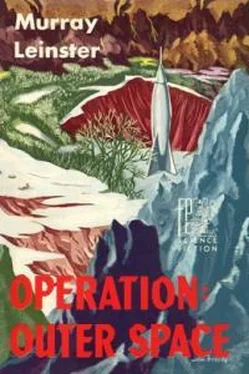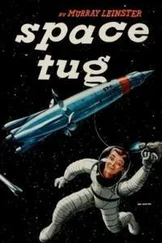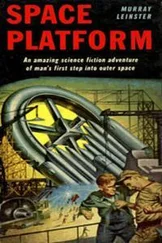Cochrane was no mathematician, but he could see that there was no data for computation on hand. After one found out how fast an acceleration of one Earth–gravity in a Dabney field of such–and–such strength speeded up a ship, something like dead reckoning could be managed. But all that could be known right now was that they had come a long way.
He remembered a television show he'd produced, laid in space on an imaginary voyage. The script–writer had had one of the characters say that no constellation would be visible at a hundred light–years from the solar system. It would be rather like a canary trying to locate the window he'd escaped from, from a block away, with no memories of the flight from it.
Cochrane said suddenly, in a pleased tone:
"This is a pretty good break—if we can keep them from finding out about it back home! We'll have an entirely new program, good for a thirteen–week sequence, on just this!"
Babs stared at him.
"Main set, this control–room," said Cochrane enthusiastically. "We'll get a long–beard scientist back home with a panel of experts. We'll discuss our problems here! We'll navigate from home, with the whole business on the air! We'll have audience–identification up to a record! Everybody on Earth will feel like he's here with us, sharing our problems!"
Jones said irritably:
"You don't get it! We're lost! We can't check our speed without knowing where we are and how far we've come! We can't find out what the ship will do when we can't find out what it's done! Don't you see?"
Cochrane said patiently:
"I know! But we're in touch with Luna through the Dabney field that got us here! It transmitted radiation before, faster than light. It's transmitting voice and pictures now. Now we set up a television show which pays for our astrogation and lets the world sit in on the prettier aspects of our travels. Hm…. How long before you can sit down on a planet, after you have all the navigational aids of—say—the four best observatories on Earth to help you? I'll arrange for a sponsor—."
He went happily down the stairs again. This was a spiral stair, and he zestfully spun around it as he went to the next deck below. At the bottom he called up to Babs:
"Babs! Get Bell and Alicia Keith and come along to take dictation! I'm going to need some legal witnesses for the biggest deal in the history of advertising, made at several times the speed of light!"
And he went zestfully to the communicator to set it up.
And time passed. Data arrived, which at once solved Jones' and the pilot's problem of where they were and how far they had come—it was, actually, 178.3 light–years—and they spent an hour making further tests and getting further determinations, and then they got a destination.
They stopped in space to extrude from the airlock a small package which expanded into a forty–foot plastic balloon with a minute atomic battery attached to it. The plastic was an electric conductor. It was a field–plate of the Dabney field. It took over the field from Earth and maintained it. It provided a second field for the ship to maintain. The ship, then, could move at any angle from the balloon. The Dabney field stretched 178.3 light–years through emptiness to the balloon, and then at any desired direction to the ship.
The ship's rockets thrust again—and the booster–circuit came into play. There were maneuverings. A second balloon was put out in space.
At 8:30 Central U. S. Time, on a period relinquished by other advertisers—bought out—a new program went on the air. It was a half–hour show, sponsored by the Intercity Credit Corporation—"Buy on Credit Guaranteed"—with ten straight minutes of commercials interjected in four sections. It was the highest–priced show ever put on the air. It showed the interior of the ship's control–rooms, with occasional brief switches to authoritative persons on Earth for comment on what was relayed from the far–off skies.
The first broadcast ensured the success of the program beyond possible dispute. It started with curt conversation between Jones and the pilot, Al—Jones loathed this part of it, but Al turned out to be something of a ham—on the problems of approaching a new solar system. Cut to computers back on Earth. Back to the control–room of the starship. Pictures of the local sun, and comments on its differentness from the sun that had nourished the human race since time began.
Then the cameras—Bell worked them—panned down through the ship's blister–ports. There was a planet below. The ship descended toward it. It swelled visibly as the space–ship approached. Cochrane stood out of camera–range and acted as director as well as producer of the opus. He used even Johnny Simms as an offstage voice repeating stern commands. It was corny. There was no doubt about it. It had a large content of ham.
But it happened to be authentic. The ship had reached another planet, with vast ice–caps and what appeared to be no more than a twenty–degree–wide equatorial belt where there was less than complete glaciation. The rockets roared and boomed as the ship let down into the cloud–layers.
Television audiences back on Earth viewed the new planet nearly as soon as did those in the ship. The time–lag was roughly three seconds for a distance of 203.7 light–years.
The surface of the planet was wild and dramatic beyond belief. There were valleys where vegetation grew luxuriantly. There were ranges of snow–clad mountains interpenetrating the equatorial strip, and there were masses of white which, as the ship descended, could be identified as glaciers moving down toward the vegetation.
But as the ship sank lower and lower—and the sound of its rockets became thunderous because of the atmosphere around it—a new feature took over the central position in one's concept of what the planet was actually like.
The planet was volcanic. There were smoking cones everywhere—in the snow–fields, among the ice–caps, in between the glaciers, and even among the tumbled areas whose greenness proved that here was an environment which might be perilous, but where life should thrive abundantly.
The ship continued to descend toward a great forest near a terminal moraine.
Jamison declaimed, wearing a throat–mike as Bell zestfully panned his camera and the ship swung down. It was an impressive broadcast. The rockets roared. With the coming of air about the ship, they no longer made a mere rumbling. They created a tumult which was like the growl of thunder if one were in the midst of the thunder–cloud. It was a numbing noise. It was almost a paralyzing noise. But Jamison talked with professional smoothness.
"This planet," he orated, while pictures from Bell's camera went direct to the transmitter below, "this planet is the first world other than Earth on which a human ship has landed. It is paradoxic that before men have walked on Mars' red iron–oxide plains and breathed its thin cold air, or fought for life in the formaldehyde gales of Venus, that they should look upon a world which welcomes them from illimitable remoteness. Here we descend, and all mankind can watch our descent upon a world whose vegetation is green; whose glaciers prove that there is air and water in plenty, whose very smoking volcanoes assure us of its close kinship to Earth!"
He lifted the mike away from his throat and framed words with his lips. " Am I still on? " Cochrane nodded. Cochrane wore headphones carrying what the communicator carried, as this broadcast went through an angled Dabney field relay system back to Lunar City and then to Earth. He spoke close to Jamison's ear.
"Go ahead! If your voice fades, it will be the best possible sign–off. Suspense. Good television!"
Jamison let the throat–mike back against his skin. The roaring of the rockets would affect it only as his throat vibrated from the sound. It would register, even so.
Читать дальше






